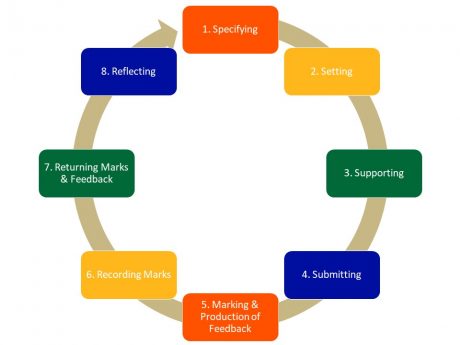
Thinking about setting up your assignments in Moodle? Over the next 5 days the TEL team will be highlighting some of the tools you could use to set up summative and formative assignments.
What is the Moodle Assignment activity tool?
The Moodle Assignment activity is one of the tools that allow students to submit a piece of work or assignment to Moodle. Tutors are then able to grade and give feedback on the piece of work. You can use the Moodle assignment for summative and formative assessments.
It is possible to give feedback on a piece of work that isn’t submitted to Moodle. (For example, an oral presentation or a piece of artwork from an exhibition). We call this an offline assignment.
Students can also submit Mahara e-Portfolios and video submissions using the Moodle assignment activity.
See our guides below to find out how to create Moodle assignments for file, Mahara e-Portfolio and video submissions.
76% of all submissions in Moodle were through the Moodle Assignment activity in 2018-19. (TEL in Numbers 2018-19)
Electronic Management of Assessment
 Assessment and feedback lie at the very heart of learning and teaching, so getting assessment and feedback right pays dividends both in terms of successful learning outcomes and improving student satisfaction.
Assessment and feedback lie at the very heart of learning and teaching, so getting assessment and feedback right pays dividends both in terms of successful learning outcomes and improving student satisfaction.
The term electronic management of assessment (EMA) is increasingly being used to describe the way in which technology is used across the assessment lifecycle to support the electronic submission of assignments, as well as marking and feedback.
The model can apply to both formative and summative assessment and to any scale of learning from a three year degree to a short course that takes place over a single day. It covers all assessment and feedback practice whether or not materials are in digital format or supported by information systems.
This high level model shows the types of activity that can be supported through technology.
At a more detailed level the processes also include: assessment scheduling; submission of assignments; tracking of submissions; extension requests and approvals; academic integrity; academic misconduct processes; examinations; marks recording; moderation, external examining and student progress checking.
Another important feature of the lifecycle is that it is iterative from both an institutional and student perspective.
Visit our webpage for more information about EMA.
Assessment for and of Learning
One of the biggest shifts we have seen in learning design in recent years is towards assessment for learning, an approach that focuses on high-quality formative assessment and feedback rather than assessment of learning, typically at the end of a course or module.
What we now know is that assessment for learning can encourage students to take responsibility for improving their own performance as they progress through a course or module. In this way, they develop skills of self-regulation that stand them in good stead throughout their lives as learners and employees.
If your assessment and feedback practices are stuck in a rut, digital offers a range of ways to change it for the better. Here are some top tips on how you can build in an assessment for learning approach…
- Make assessment more engaging by incorporating activities based on blogging or peer assessment and review.
- Cut down time spent on written feedback by giving audio feedback to the whole group then asking students to show how they have adjusted their own performance in the light of your feedback.
- Wherever possible, make assessment more varied and inclusive by allowing students to draw on their personal experience and provide choice over topics, format and timing of assignments. Formats other than the written essay are harder to plagiarise too. Technology can support choice and flexibility in assessment by allowing students to produce assignments in a range of different media.
- Ensure that learners can act on their feedback by making visible when all assignments in a modular programme are due. This helps avoid assignment bunching, evens out student effort and shows exactly how students are to be assessed.
- Build in reflective tasks to help students evaluate their progress towards learning goals.
- Using social media, enable students to open up their developing work to critical scrutiny from peers, employers and other experts.
- Provide opportunities for self-testing. Encourage students to access these on their own electronic devices while in the classroom as well as in their own time.
guides
Bulk Upload of Grades and Feedback
Quick guide to creating a Mahara e-portfolio submission portal in Moodle
Quick guide to creating a Video submission portal in Moodle
Tomorrow, we shall be looking at the Turnitin assignment activity.
If you have any questions or comments then please leave them below. If you require any further help, information, advice or have any ideas on other guides you would like to see, please contact TEL via the Staff IT Help portal.

0 responses on "Assessment Series Day 1 - Moodle Assignments"